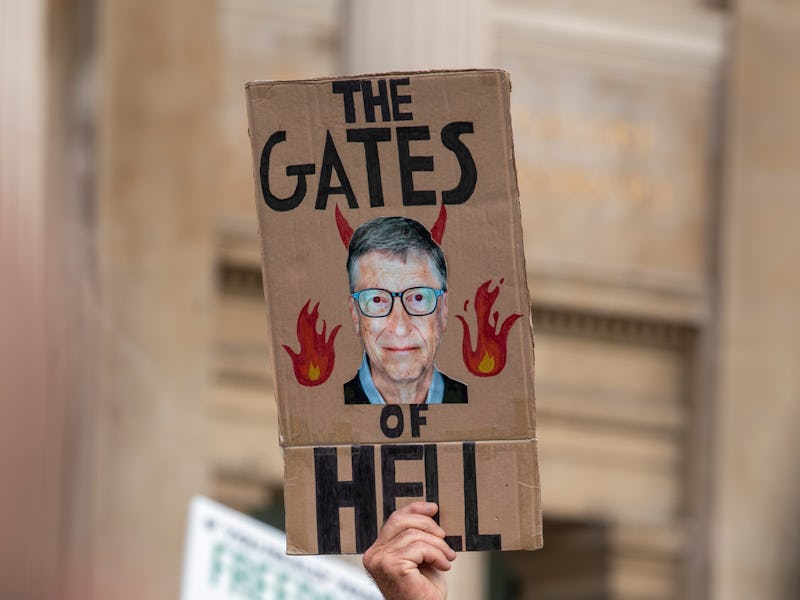How a 2001 techno-thriller predicted Bill Gates conspiracy theories
Antitrust has never been more relevant, and it's streaming for free online right now.

According to two eye-opening polls, more than a quarter of U.S. citizens (and almost half of Fox News viewers, unsurprisingly) have invested in that outlandish theory about Bill Gates, the coronavirus, and the vaccine that’s apparently masquerading dastardly plans to record our every waking move. It’s the perfect time, therefore, to revisit a movie, which just happens to be celebrating its 20th anniversary this week, Antitrust.
Now, I’m not suggesting for one minute that a largely-forgotten techno-thriller starring Ryan Philippe is responsible for the Microsoft co-founder’s status as the QAnon movement’s ultimate bogeyman. Still, January 12, 2001 was perhaps the first time Hollywood threw the intentions of the world’s richest man into question.
Of course, the modest box office hit goes out of its way to keep the lawyers at bay. The villain of the piece, Gary Winston, is an entirely fictional character who, in a brief discussion about their shared passion for digital artwork, proves that Gates exists as an entirely separate entity. But from the schoolboyish haircut to the grimacing expressions, it’s clear that Tim Robbins — blatantly having a ball going full-on megalomaniacal — based his performance on the multi-billionaire.
Tim Robbins as Bill Gates-alike Gary Winston.
At first, the Oscar winner leans into Gates’ more playful side, scoffing potato chips and drinking Pepsi while expressing awe at the “train set” nature of his latest product. However, it’s not long before he’s channeling the entrepreneur’s apparent ruthless streak, barking orders at subordinates in his cavernous lair and angrily trying to justify his more questionable practices (“Everyone in business tries to get ahead/I get there first, I'm a bad guy”).
No stranger to blurring narrative boundaries, Sliding Doors director Peter Howitt wanted to explore the belief that “you can’t be that successful without being really badly criminal.” It was a timely mission: during the shoot, Gates was involved in the historic antitrust trial that saw Microsoft accused of institutional bullying and crushing rivals such as Netscape to illegally protect its monopoly.
To describe Winston’s antics as “badly criminal,” though, would be putting it mildly. Plagiarism, spying, frame-ups, staged car accidents, deadly beatings, slightly perplexing honeytraps. The tech genius stops short of nothing to ensure that Synapse, a network which “links every communications device on the planet,” meets its launch deadline.
The protege and the honeytrap.
Winston’s methods of obtaining the all-important coding seemed unnecessarily elaborate back in 2001. One particular tactic involves triggering a potentially fatal sesame seed allergy, for example. Yet, the outlandish conspiracies surrounding his real-life inspiration today prove that, two decades later, the masses are more than willing to believe such convoluted quests for world domination.
If Gates really is planning to depopulate the world or track us with microchips disguised as medicine, then he’s doing a better job of hiding the evidence than his cinematic counterpart. Winston is a ridiculously self-incriminating crook (for some reason, footage of his wrongdoings is stored on a daycare center’s database, handily accessible to any mistrusting protege trying to dig up some dirt). He’s a rather cheap one, too, giving the job of taking out a dissenting programmer, not to a professional hitman, but two frosted-tipped lackeys at his NURV (Never Underestimate Radical Vision) corporation.
Gates has never publicly commented on this loose depiction. Nevertheless, remarks he made about another may well give it some credence. In TNT’s 1999 TV movie Pirates of the Silicon Valley, Anthony Michael Hall portrayed the visionary as a shifty, immoral hustler who would no doubt sell his own grandmother to get one over the competition. Yet when asked on a 2013 Reddit thread about the former Brat Packer’s performance, Gates freely admitted it was “reasonably accurate.”
Although the parallels between Winston and Gates have only increased — in conspiracy theorists’ eyes, anyway — over the last two decades, the rest of Antitrust now seems part of a long-distant era. The faith the film has in open source software sure seems charmingly naïve when seen through a 2021 lens.
The world’s most photogenic tech genius.
“Human knowledge belongs to the world,” our hero Milo (Philippe relying on a pair of glasses to convince as a computer nerd) proudly reiterates having hijacked the world’s screens to expose Winston’s murderous ways. Remember the sheer fury that greeted U2’s automatic album download? Well, imagine the riots that would ensue if what appeared to be a crudely-made cyber prank suddenly interrupted everyone's latest binge-watch.
Instead, every viewer unites in their horror, and Winston is apprehended by the law before anyone can scream "fake news." A world where the general public accepts the cold hard facts and those who abuse their power instantly face consequences for their actions? Even those who haven't bought into all the Bill Gates paranoia may argue this is one implausibility too far.
Antitrust is streaming for free now on Pluto TV in the U.S.